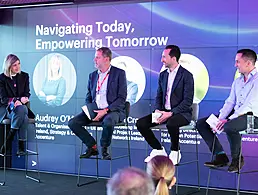Do internships provide a helpful gateway into industry or do they still fit the stereotype of tea-making and photocopying?
The value of internships has been a hotly debated topic for years. With little reform in many countries, it’s no wonder that the stereotype of ‘tea-making interns’ lives on.
We all have stories – be it our own tales or some from people we know – about internships and work placements in which interns were given grunt work far and away from the industry they’re supposed to be learning from.
But are internships really still that bad? A recent Lloyds Banking Group survey suggests they are – in the UK, at least.
According to The Independent, the survey shows that more than half of young people said they spent the majority of their internships printing and photocopying documents. A third of respondents also said that most of their day was spent making tea and picking up lunch.
How about a cuppa?
Unless you feel that your photocopying and tea-making skills could do with a bit of work, this is not conducive to interns who are looking to gain real experience in an industry they want a career in some day.
Should internships be avoided completely by young people? Is there any benefit to them at all? James Milligan of Hays believes they shouldn’t be avoided, but they should be considered carefully.
“A successful internship gives the candidate an edge when they are seeking their first full-time job,” he said. “I believe it is really important that the internship is well qualified by the candidate before committing to an organisation.”
Milligan also advised those who are considering internships to research the prospective company well, along with the possible job duties. Sites such as Glassdoor and RateMyPlacement are also helpful for getting honest reviews from people who have been there.
Internships can often be a coin flip between being taken advantage of, and being completely thrown in at the deep end and essentially being made to do the work of someone who should be getting paid.
Free labour
In Ireland, the scrapped internship scheme JobBridge had its own problematic abuses, which still line the walls of the internet.
Considered to be one of the most controversial schemes in Ireland, the idea was to offer unemployed people a six-to-nine-month internship with a company, with a view to getting back into the workforce. During this time, the employee would receive their social welfare benefits and an extra €50 per week.
However, you only have to type ‘JobBridge horror stories’ into any search engine to find everything from a sandwich artist to a career adviser – no, really.
‘Less than a third of young people said they feel internships boost employability’
– LLOYDS BANKING GROUP
Not only were there countless companies abusing the opportunity for free labour, but there are also hundreds of personal accounts from those who were given the duties of a full-time staff member without the matching pay cheque, only to be replaced nine months later with another willing intern.
But, of course, it’s easy to point out the negatives of internships without mentioning the good. As Milligan said, the best guard against internships that take advantage is to do as much research as you can.
Do they have a designated internship scheme? What are you expecting to learn from the internship? How much are they expecting of you? What kind of work will you be doing?
The Lloyds Banking Group survey certainly highlighted young people’s disillusion with the benefits of internships.
Only a fifth of respondents said that they feel internships have no – or even a negative – impact on future employment opportunities, and less than a third of young people said they feel internships boost employability.
Take the good with the bad
With those statistics in mind, it can be easy to tar all internships with the same negative brush and assume they’re of little benefit to young people.
However, some companies are honing their internship schemes and proudly waving a flag to prove that theirs won’t be just about upskilling in the art of making tea, coffee and photocopies.
For example, the Aon Centre for Innovation and Analytics gives interns the chance to take part in its CEO Challenge to give them a feel for what the sector is really like.
Many educational institutes also offer work placements as part of their courses. These are usually vetted by the institutes to ensure that the internship is of benefit to students’ futures.
At Dublin City University (DCU), 32 of its degree programmes offer work placements as part of an integrated training (INTRA) programme.
Maeve Long, head of INTRA at DCU, said the vast majority of those placements are full-time, paid internships – with a few exceptions.
In terms of offering students value and learning opportunities, Long said the employers they work with are heavily vetted prior to coming on board officially.
“We discuss with them what their requirements are, what they can offer students; we try and match them with the skills of our students, depending on what their requirements are, and we ask them, at the very minimum, for a very detailed job description,” she said.
Long said DCU also contacts the students while on placement to make sure things are going OK. “The second port of call, then, is we have a tutor-visit programme.” This is when a particular academic staff member is sent out to the placement to make an assessment on the suitability of the job in question.
For young people who aren’t protected by an educational body, Long advises them to ask for a letter of employment with terms and conditions. “If you are hired by an organisation as a trainee or an intern, you do have certain minimum rights under the constitution,” she said.
Long also strongly advised those who feel they are being exploited to walk away. “You don’t have to put up with it, there are always other opportunities.”
The perfect storm
The other side of the internship coin is, because they are mostly taken up by young people, students and graduates, there’s a generational gap that leads to many thought pieces on those seemingly pesky, self-entitled millennials who think they’re too good to make tea.
The fact is, everything changes. Every generation experiences different circumstances. Many of those who were at intern age during the Celtic Tiger probably didn’t have the pressure of working for free to get experience.
Likewise, unemployment figures, plummeting revenue and staff redundancy trends during the recession have made Ireland and other suffering economies the perfect breeding ground for exploitative internships and free labour.
‘Being exploited in employment should not be a rite of passage’
It’s always easy to judge from the outside, especially for older generations who really feel like they’ve gone through it before and feel like it’s a rite of passage.
But being exploited in employment should not be a rite of passage. Internships that leave young people feeling disillusioned about their future will only hurt the economy further in the long run.
Long said she wouldn’t encourage students to work for nothing. “I think that’s just not acceptable under any circumstances,” she said. “It’s not acceptable if it’s an organisation.”
She also said that for those who worry about not getting valuable enough experience, they should say something. “Speak up for yourself and make sure you’re getting the work that you want to do.”
Companies that nurture interns, help them upskill and turn them into highly skilled employees – be it for the company itself or otherwise – enable people to go out into the world with more real-life experience on their CV than when they started.
Millennials and the younger generations that follow should not be slated for demanding more from their experience. When it comes to interns, the question should not be, ‘How do we keep them busy?’ or ‘How do we deal with them?’
The question should be: ‘How can we best use the skills they already have to help them gain experience and upskill in things they don’t yet know?’




